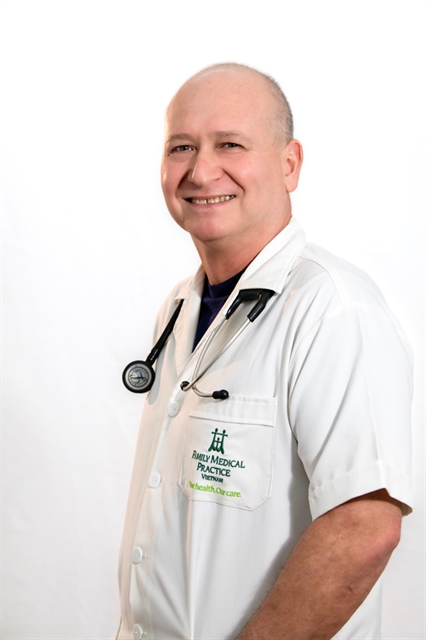Weather:
- Ha Noi 33oC
- Da Nang 33oC
- Ho Chi Minh 32oC
Dr Yami Shapira*
Fatty liver disease was once considered primarily a condition of alcoholics, with excessive alcohol leading to fatty liver.
However, our understanding has evolved significantly over the years. It is now recognised that a large proportion of fatty liver disease cases occur without a history of heavy alcohol use. This has led to the adoption of the term metabolic dysfunction-associated fatty liver disease (MAFLD), which more accurately reflects this condition's strong association with the metabolic syndrome, which refers to a cluster of conditions, including obesity, diabetes, high blood pressure, excess abdominal fat and abnormal cholesterol levels. MAFLD, MASLD, NAFLD, NASH, fatty liver, or hepatic steatosis are basically the same terms and reflect the metabolic effect of modern lifestyle and diet.
Epidemiology and risk factors

MAFLD is now recognised as the most common chronic liver disease globally, affecting approximately 25 per cent of the population. Its prevalence is significantly higher among individuals with the metabolic syndrome. Alarmingly, childhood obesity and MAFLD are on the rise too. One publicised action to try to combat this epidemic was an initiative to ban soft drink vending machines from schools. In Việt Nam, the prevalence of MAFLD has mirrored global trends, with rising rates of obesity and type 2 diabetes. Urbanisation and lifestyle changes, such as a shift toward diets rich in calories and simple carbohydrates and reduced physical activity, have exacerbated this trend.
Clinical consequences
MAFLD is not only common but also carries the risk of progression to advanced liver disease. A significant proportion of patients may develop fibrosis and cirrhosis, which represent the end stages of chronic liver disease. Cirrhosis, characterised by extensive scarring of the liver, is irreversible and can lead to lethal complications such as portal hypertension, ascites, hepatic encephalopathy and liver cancer. It is a condition with a dramatic impairment of quality of life and for which the only cure is liver transplantation. Beyond liver-related issues, MAFLD serves as a marker of cardiovascular disease risk, emphasising the broader systemic implications of the disease.
Diagnosis
Diagnosing MAFLD requires evidence of hepatic fat accumulation (steatosis), detected through imaging modalities like ultrasound or MRI, together with the presence of metabolic risk factors. As there are no specific symptoms for early-stage MAFLD, mild liver enzyme elevations on routine bloodwork often alert the clinician to the condition and prompt investigations, but having metabolic syndrome should by itself raise alertness to the diagnosis. Mild alcohol consumption (less than 20 grams per day for women and 30 grams per day for men) usually does not cause fatty liver, but combined MAFLD and alcohol-related liver disease can coexist (MASH-ALD) and worsen prognosis, so cutting back on alcohol is advised for all people with MAFLD.
Management
Management of MAFLD primarily focuses on addressing the underlying metabolic dysfunctions. Weight loss, reducing calories and simple sugars, and increased physical activity are highly beneficial. Pharmacological treatments may be considered, especially for patients with advanced liver disease or those who do not respond adequately to lifestyle interventions. The new weight loss injections have shown great promise, but at a great cost and possible unpleasant side effects. Novel medications targeting inflammation and fibrosis are under investigation.
Role of multidisciplinary teams in specialised clinics
Effective management of MAFLD necessitates a multidisciplinary team approach (MDT). MDTs in specialised clinics, typically comprising hepatologists, endocrinologists, dietitians and physical therapists, provide comprehensive care. They create personalised dietary and exercise plans, manage associated conditions like diabetes and obesity, and educate patients on lifestyle adherence. By ensuring regular follow-ups and coordinated interventions, MDTs optimise treatment outcomes, reduce complications and improve both liver health and overall metabolic well-being.
Conclusion
Being diagnosed with MAFLD should serve as a wake-up call to take steps toward better health. By addressing metabolic syndrome through necessary lifestyle and dietary changes, along with appropriate medications, individuals significantly lower their risk of cardiovascular events and progressive liver disease. MAFLD in its initial stages is reversible. Adopting healthier habits not only improves liver health but also enhances overall well-being, offering the opportunity to feel more energetic and youthful, while reducing future health complications. Family Medical Practice

*Dr Yami Shapira is a highly experienced physician specialising in both internal medicine and gastroenterology. He earned his medical degree from the prestigious Hebrew University of Jerusalem Medical School. Following this, he completed his residency in internal medicine at Hadassah University Hospital, and subsequently pursued advanced training in gastroenterology at Tel Aviv Sourasky Medical Center (TASMC).
Born and raised in Israel, Dr Yami is fluent in English and Hebrew.
What makes Dr Yami special to his patients is his unique and compassionate communication style, his unwavering commitment to providing the highest quality care and follow-up and his ability to deliver this with a warm sense of humour and a genuine smile.
FMP Healthcare Group operates medical centres in major cities including HCM City, Hà Nội and Đà Nẵng, offering consultations with international doctors, check-up centres, and emergency ambulance services.
Visit FMP Hanoi 24/7 at 298I Kim Mã Street, Kim Mã Ward, Ba Đình District.
To book an appointment, please call (024).3843.0748, chat via Whatsapp, Viber or Zalo on +84.944.43.1919 or email hanoi@vietnammedicalpractice.com.


